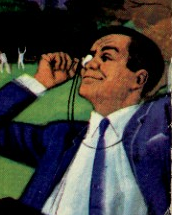
The third Psmith book, Psmith, Journalist, spends most of its time answering the question:
How much flak could a Psmith flak, if a Psmith could flak flak?
We have at the very least the following answers:
-
Psmith can usurp a paper entitled Cosy Moments and turn it into a campaign against the landlords of the early 20th century New York tenement slums;
-
Psmith can defuse the temper of six self-entitled writers he let go upon becoming sub-editor of Cosy Moments;
-
Psmith can fuel the new audience for Cosy Moments by opportunities that others miss by way of being more sensible, i.e., find a young boxing prospect and turn him into a daily feature by allowing him to commit violence upon the art that is writing and publish it every day.
-
Psmith will not stand down when an emissary of the most unscrupulous and hidden financiers of “Pleasant Street” (where said slums are) visits him and attempts to bribe him into shutting down the slum lord articles;
-
Psmith will not flee like a sensible Cambridge student should when said financier starts paying underworld crime gangs to shut down the paper and its staff by any means possible;
-
Psmith runs into schemes more violent and deadly to any he’s ever been exposed to before, and still does not flee, in the end managing to (barely) not die.
A note: Psmith, Journalist has a little casual racist terminology mentioned in a few remarks in the opening chapter, as well as a scene in one of the last chapters, which dates it as a work from the first decades of the 20th century, and particularly that of a British man writing about a multi-cultural American city. Then again, it’s not like most of the American authors at the time did much better, and many much worse.
In his previous two books, Psmith was a force of nature, and here Wodehouse gives the spotlight fully unto him—this time, while Psmith tags along with Mike on his cricket team’s tour of America, Psmith stays behind in New York while Mike’s cricket team visits Philadelphia. Bored and lonely, Psmith decides to amuse himself with the challenge of turning a family paper into a real news sheet with a booming circulation number, taking temporary editor Billy Windsor (standing in for Cosy Moments‘ real editor, off taking some 10 weeks vacation of complete rest in the Appalachians) under his wing. Think Mike, but more cowboy-ish.
Sadistically, because Psmith is so resourceful, cunning, arguably insane, and brave, Wodehouse decides to throw him into the deep end with the sharks of the New York underworld. The result is an unsettling hybrid of American violence, yellow journalism, upper crust corruption, lower class hell, and the understated British stiff upper lip—with Psmith’s distinct and unique touch.
In the test to destruction that is Psmith, Journalist, one suspects as the violence escalates that Psmith, of England’s upper class, cosseted and unexposed to the darker underside of crime, will give it all up and head back to the safety of England. However, we find that apparently Psmith is made of sterner stuff.
In his previous encounters with those with whom fate had brought him in contact there had been little at stake. The prize of victory had been merely a comfortable feeling of having had the best of a battle of wits; the penalty of defeat nothing worse than the discomfort of having failed to score. But this tenement business was different. Here he had touched the realities. There was something worth fighting for. His lot had been cast in pleasant places, and the sight of actual raw misery had come home to him with an added force from that circumstance. He was fully aware of the risks that he must run. The words of the man at the Astor, and still more the episodes of the family friend from Missouri and the taximeter cab, had shown him that this thing was on a different plane from anything that had happened to him before. It was a fight without gloves, and to a finish at that. But he meant to see it through.
Things get worse, and worse, and worse. But in the end, Psmith, of course, manages to see it through, and not too much worse for the wear.
Psmith, Journalist is an unusual work in the Wodehousian canon, an odd bit of grittiness in American reality tales sandwiched between his early school stories and his later, more familiar Edwardian-age romantic comedies.
Will you be poorer for not reading it? I don’t think so. But it is an interesting contrast in the history of Wodehouse, and very nearly the last Psmith tale.
Thankfully, someone near and dear to Wodehouse wanted another Psmith story, and thus some years later the world was presented with Leave it to Psmith, a much better last curtain for the incomparable and incorrigible Psmith. Next time, we’ll explore the benefits of a more seasoned Wodehouse on the character of Psmith in one of the best comedic novels ever written.
Posts in this series: